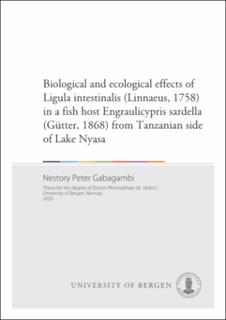| dc.contributor.author | Gabagambi, Nestory Peter | |
| dc.date.accessioned | 2020-10-13T14:04:18Z | |
| dc.date.available | 2020-10-13T14:04:18Z | |
| dc.date.issued | 2020-10-23 | |
| dc.date.submitted | 2020-09-26T03:06:38.823Z | |
| dc.identifier | container/22/37/37/03/22373703-33f0-4664-94ed-65b429c44aa5 | |
| dc.identifier.isbn | 9788230860076 | |
| dc.identifier.isbn | 9788230855287 | |
| dc.identifier.uri | http://hdl.handle.net/1956/24139 | |
| dc.description.abstract | The current thesis investigates the epidemiological, behavioral and evolutionary effects of the tapeworm Ligula intestinalis in the ‘Nyasa sardine’ (Engraulicypris sardella), an intermediate fish host, endemic to Lake Nyasa, Tanzania.
Most of the available knowledge on this parasite, and its host interactions, comes from small lakes and water reservoirs in Northern Europe, where the parasite tends to show epidemic cycles, where prevalence increases very rapidly, and causing population crashes in its host. This is followed by a rapid decline in infection levels as transmission rates are reduced, and ultimately leads to the local extinction of the parasite. My research investigated the dynamics between the parasite and its intermediate host in Lake Nyasa, a vast tropical lake which differs markedly in its ecological conditions compared to the small and relatively homogenous lakes that have been studied previously.
Given the size of Lake Nyasa, we predicted that transmission rates and levels of infection of this parasite would vary markedly, both in time and space within Lake Nyasa. In accordance with this, we found that the population dynamics of the parasite appeared to change into an endemic state with small variations in prevalence from year to year. Therefore, we suggested that it is unlikely that L. intestinalis infestation would have a devastating effect on the E. sardella population within Lake Nyasa, as has been reported for smaller water bodies in the European freshwater systems (Paper I).
In this thesis, we also investigated the influence of the cestode L. intestinalis on the behavior of its intermediate host E. sardella and explored if this parasite could cause adaptive modifications of its intermediate host (depending on the parasite infectivity stage) that could lead to increased rates of parasite transmission. We found that fish hosts infected with infective stage parasite larvae significantly altered antipredator defense behavior compared to uninfected individuals, and that hosts infected with pre-infective stage larvae behaved more or less the same as uninfected hosts (Paper II).
Finally, based on our findings that we did not observe any indications of local extinctions of the cestode L. intestinalis in Lake Nyasa (Paper I), this suggests the parasite may act as a continuous selective force on the fish host E. sardella and may drive shifts in life history traits of E. sardella towards a higher reproductive investment.
Consistent with our predictions, we found that the cestode L. intestinalis had a strong negative effect on the fecundity of E. sardella which may have driven the fish host to increase investment in reproduction at the expense of growth. Our findings therefore suggest that the cestode L. intestinalis might have selected for increased investment in current reproduction in its fish host E. sardella in Lake Nyasa. These results are discussed with respect to other selective factors that could have also influenced the life history traits of E. sardella in Lake Nyasa (Paper III). | eng |
| dc.language.iso | eng | eng |
| dc.publisher | The University of Bergen | eng |
| dc.relation.haspart | Paper 1: Gabagambi, N., & Skorping, A. (2018). Spatial and temporal distribution of
Ligula intestinalis (Cestoda: Diphyllobothriidea) in usipa (Engraulicypris sardella)
(Pisces: Cyprinidae) in Lake Nyasa. Journal of Helminthology 92: 410-416. The article is not available in BORA due to publisher restrictions. The published version is available at: <a href="https://doi.org/10.1017/S0022149X17000724" target="blank">https://doi.org/10.1017/S0022149X17000724</a> | eng |
| dc.relation.haspart | Paper II: Nestory P. Gabagambi, Anne-Gro V. Salvanes, Frank Midtøy, Arne Skorping
(2019). The tapeworm Ligula intestinalis alters the behavior of the fish
intermediate host Engraulicypris sardella, but only after it has become infective to
the final host. Behavioural processes 158: 47-52. The article is available in the main thesis. The article is also available at: <a href="https://doi.org/10.1016/j.beproc.2018.11.002" target="blank">https://doi.org/10.1016/j.beproc.2018.11.002</a> | eng |
| dc.relation.haspart | Paper III: Nestory Peter Gabagambi., Arne Skorping., Mwita Chacha., Kwendwa Jonathan
Kihedu., Adele Mennerat (2020). Increased reproductive investment in an
exploited African cyprinid fish following invasion by a castrating parasite in
Lake Nyasa, Tanzania. The article is not available in BORA. | eng |
| dc.rights | Attribution-NonCommercial-NoDerivs (CC BY-NC-ND) | eng |
| dc.rights.uri | https://creativecommons.org/licenses/by-nc-nd/4.0/ | eng |
| dc.title | Biological and ecological effects of Ligula intestinalis (Linnaeus, 1758) in a fish host Engraulicypris sardella (Gütter, 1868) from Tanzanian side of Lake Nyasa | eng |
| dc.type | Doctoral thesis | eng |
| dc.date.updated | 2020-09-26T03:06:38.823Z | |
| dc.rights.holder | Copyright the Author. | eng |
| fs.unitcode | 12-60-0 | |

